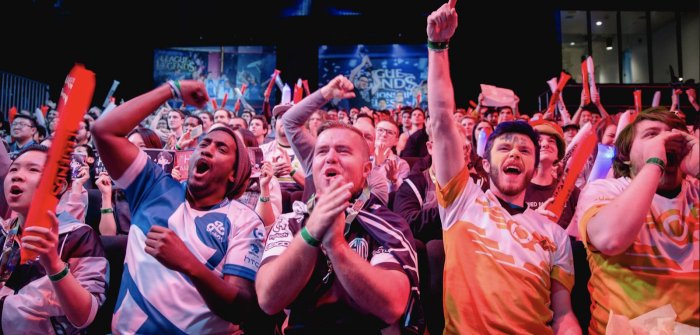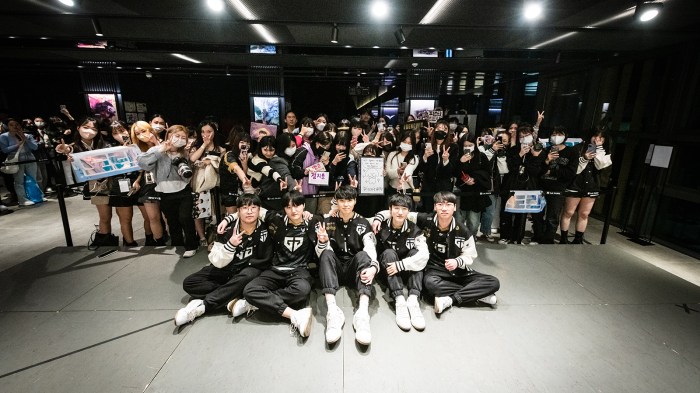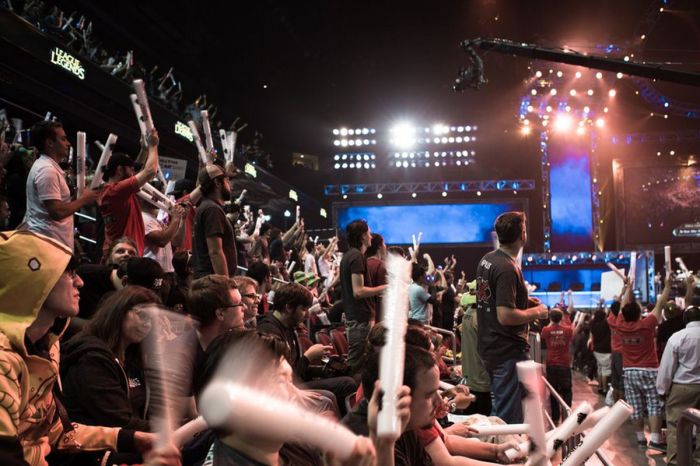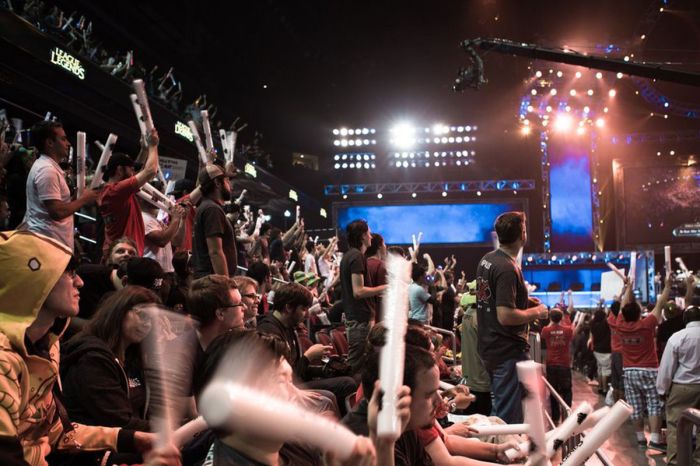Esports fan community: It’s way more than just watching dudes play video games. Think passionate, dedicated fans who form intense bonds, create vibrant online cultures, and seriously impact the industry’s bottom line. We’re talking millions of people globally, united by their love for competitive gaming, and this exploration dives into their demographics, habits, and the massive influence they wield.
From the casual viewer tuning in for highlights to the hardcore fan who attends every tournament, the esports fan base is incredibly diverse. Their engagement fuels the industry, driving merchandise sales, ticket revenue, and sponsorship deals. Understanding this community is key to understanding the future of esports itself – and it’s a wild ride.
Esports Fan Engagement and Consumption Habits

Esports fandom isn’t just about watching the games; it’s a deeply immersive experience that blends passionate community engagement with diverse content consumption. Fans connect with their favorite teams and players in a multitude of ways, creating a vibrant and multifaceted ecosystem. Understanding these engagement patterns is key to building successful marketing strategies within the esports industry.Esports fans engage with their favorite teams and players through a variety of channels and activities.
This engagement fuels the growth of the esports industry and provides valuable insights into fan preferences and behaviors.
Methods of Esports Fan Engagement
Fans connect with their favorite teams and players in several key ways. Live streaming platforms like Twitch and YouTube are central to the experience, offering real-time interaction through chat features and community building. Attending live esports events provides an unparalleled level of excitement and a chance to interact directly with players and other fans. Online communities, such as subreddits and Discord servers, foster a sense of belonging and allow for discussions, strategy sharing, and fan-created content.
Social media platforms like Twitter and Instagram facilitate direct communication with players and teams, fostering a personal connection.
Types of Esports Fan Content Consumption
Esports fans consume a wide variety of content, catering to different preferences and levels of engagement. Short, action-packed highlight reels are popular for quick consumption and social sharing. Full match replays allow for in-depth analysis and strategic review. Behind-the-scenes content, such as player vlogs and documentary-style videos, offers a more personal connection with the teams and players, humanizing the competitive aspect of esports.
This variety of content caters to a diverse range of fan preferences and engagement levels.
Hypothetical Marketing Campaign Targeting Specific Esports Fan Segments
Let’s imagine a marketing campaign for a hypothetical energy drink, “HyperFuel,” targeting esports fans. We’ll segment fans based on their consumption habits:
| Fan Segment | Consumption Habits | Marketing Strategy |
|---|---|---|
| Casual Viewers (Highlights) | Primarily consume short highlight reels on social media. | Short, visually engaging ads on platforms like TikTok and Instagram, featuring popular players endorsing HyperFuel. Focus on quick, impactful messaging. |
| Dedicated Viewers (Full Matches) | Watch full matches and actively participate in online communities. | Sponsorships of esports tournaments and teams, integrating HyperFuel branding into streaming broadcasts and online community initiatives. Offer exclusive in-game items or discounts for viewers. |
| Superfans (Behind-the-Scenes Content) | Consume all types of content, including behind-the-scenes features. Highly engaged with teams and players. | Collaborate with teams on exclusive content featuring HyperFuel, such as player interviews and behind-the-scenes access. Develop limited-edition HyperFuel products featuring team logos. |
This multi-pronged approach allows HyperFuel to reach a wider audience and tailor its messaging to resonate with specific fan segments based on their individual content consumption preferences. The campaign leverages various marketing channels to maximize its reach and impact.
The Economic Impact of Esports Fans: Esports Fan Community

Esports wouldn’t be the billion-dollar industry it is today without the passionate fans fueling its growth. Their engagement extends far beyond simply watching matches; it’s a multifaceted contribution that directly impacts the financial health of teams, organizations, and the entire ecosystem. This section will delve into the various ways esports fans contribute to the industry’s economic success.
Esports fans are the lifeblood of the industry’s financial success. Their spending habits, driven by passion and engagement, create a substantial revenue stream for various stakeholders. This revenue isn’t limited to ticket sales; it’s a complex interplay of several factors, all stemming from the dedicated fanbase.
Revenue Streams Generated by Esports Fans
The economic impact of esports fans is clearly visible across multiple revenue streams. These streams represent the diverse ways fans contribute financially, ranging from direct purchases to indirect support through sponsorships.
| Revenue Stream | Description | Example | Impact |
|---|---|---|---|
| Merchandise Sales | Purchase of team jerseys, hats, figurines, and other branded items. | A fan buying a limited-edition jersey from their favorite team’s online store. | Direct revenue for teams and merchandise producers. |
| Ticket Sales | Purchasing tickets to attend live esports events, both online and offline. | Fans buying tickets to attend a major League of Legends tournament final. | Revenue for event organizers and venue owners. |
| In-Game Purchases | Buying virtual items, skins, and boosts within esports games. | A player purchasing a new skin for their character in Valorant. | Significant revenue for game developers and publishers. |
| Sponsorships (Indirect) | Increased viewership and engagement leading to higher sponsorship value for teams and leagues. | A beverage company sponsoring a popular esports team due to the team’s large and engaged fan base. | Indirect revenue for teams and leagues through increased sponsorship deals. |
Factors Influencing Spending Habits of Esports Fans
Several factors influence how much esports fans spend. Understanding these factors is crucial for teams and organizations to tailor their strategies and maximize revenue generation.
Team loyalty plays a significant role. Fans deeply invested in a particular team are more likely to spend on merchandise and tickets. The perceived value of the product or experience also matters; limited-edition items or exclusive access to events can drive spending. Furthermore, the fan’s disposable income and overall engagement level (e.g., how much time they spend watching and participating in the esports community) strongly influence their spending habits.
Finally, marketing and promotional efforts by teams and organizations directly impact purchase decisions. Effective marketing can significantly increase sales of merchandise and tickets.
The Future of the Esports Fan Community

The esports fan community is a dynamic and rapidly evolving landscape. Its future hinges on several key factors, including technological advancements, the continued growth of the esports industry itself, and the evolving preferences of its audience. Understanding these factors is crucial for stakeholders looking to navigate the future of esports engagement.The next decade will likely witness a significant shift in how fans interact with esports.
This shift will be driven by a combination of technological innovation and a deeper understanding of fan behavior and preferences. The industry’s success will depend on its ability to adapt to these changes and create engaging experiences that resonate with a growing and diverse audience.
Technological Advancements and Fan Engagement
Technological advancements will play a pivotal role in shaping the future of esports fan engagement. The rise of virtual and augmented reality (VR/AR) technologies offers exciting possibilities for immersive viewing experiences. Imagine fans wearing VR headsets to feel like they are courtside at a League of Legends World Championship match, or using AR overlays on their phones to interact with game elements during a broadcast.
This level of immersion will create a more engaging and personalized experience, fostering deeper connections with teams and players. Furthermore, advancements in streaming technology, such as higher resolutions and improved latency, will continue to enhance the viewing experience for online audiences. The integration of AI-powered personalization tools will also allow platforms to tailor content and recommendations to individual fan preferences, creating more targeted and relevant experiences.
For example, a platform might suggest highlights of a specific player’s performance based on a fan’s viewing history.
Challenges and Opportunities in Maintaining and Expanding the Fanbase
Maintaining and expanding the esports fanbase presents both significant challenges and substantial opportunities. One major challenge is ensuring accessibility. Esports needs to overcome the digital divide to reach broader audiences, particularly in developing regions with limited internet access. Opportunities lie in expanding into new markets and demographics. This involves creating content and experiences that resonate with diverse cultural backgrounds and age groups.
For example, creating localized broadcasts with commentators who speak different languages or developing mobile-first esports experiences to reach a wider audience. Another challenge is combating toxicity within the community. Creating a more inclusive and welcoming environment is crucial for long-term growth. Opportunities exist in partnering with organizations that promote positive online behavior and in developing tools to better moderate online interactions.
A Hypothetical Scenario: Esports Fan Engagement in 2030, Esports fan community
By 2030, we might see esports viewed less as a spectator sport and more as an interactive, participatory experience. Imagine a scenario where fans can actively influence gameplay through micro-transactions that impact in-game events, similar to how some sports fans already participate in fantasy leagues. Esports venues might incorporate interactive elements, such as augmented reality overlays that provide real-time stats and player information, or even allow fans to virtually participate in pre-game activities.
Furthermore, the lines between traditional sports and esports could blur further. We could see hybrid events where professional athletes compete alongside esports players, or even see the rise of new esports leagues based on existing traditional sports. For example, a virtual reality version of the NBA where fans can create and manage their own virtual teams, compete against other fans, and watch professional matches in a fully immersive environment.
This scenario represents a shift from passive consumption to active participation, fundamentally altering the nature of fan engagement.
Question & Answer Hub
What’s the average age of an esports fan?
It’s pretty broad, but a large chunk falls within the 16-35 age range, though younger and older fans are definitely part of the mix.
How much money do esports fans spend annually?
That varies wildly depending on the fan’s level of engagement, but it can range from small amounts on merchandise to thousands on tickets and travel to events.
Are there any major differences between fan communities for different games?
Totally! Each game has its own unique culture and community norms. Think of the differences between, say, the League of Legends and Dota 2 communities – they’re both huge, but their styles and traditions differ significantly.
How do esports teams build loyalty?
It’s a mix of things: strong team branding, engaging social media presence, player personalities, and offering exclusive content or experiences for their most dedicated fans.
